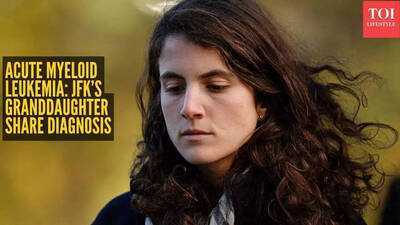What is Acute Myeloid Leukemia: JFK's granddaughter Tatiana Schlossberg diagnosed with the disease
ETimes November 23, 2025 03:39 AM
 Former American President John F. Kennedy's granddaughter Tatiana Schlossberg recently revealed that she had been diagnosed with acute myeloid leukemia . The 35-year-old who is the daughter of Caroline Kennedy and Edwin Schlossberg revealed the news in an essay published by The New Yorker on Saturday, November 22nd.
Former American President John F. Kennedy's granddaughter Tatiana Schlossberg recently revealed that she had been diagnosed with acute myeloid leukemia . The 35-year-old who is the daughter of Caroline Kennedy and Edwin Schlossberg revealed the news in an essay published by The New Yorker on Saturday, November 22nd.
The scary diagnosis
Schlossberg said that she had learned of the diagnosis after giving birth to her second baby in May 2024 after the doctor noticed an imbalance in her white blood cell count .
“A few hours later, my doctor noticed that my blood count looked strange. A normal white-blood-cell count is around four to eleven thousand cells per microliter. Mine was a hundred and thirty-one thousand cells per microliter,” she wrote. She further recalled that the doctor thought that it could just be related to pregnancy and delivery or it could be leukemia. She was eventually diagnosed with "a rare mutation called Inversion 3."
She shared that she "could not be cured by a standard course" and was told that she would need months of chemotherapy and a bone-marrow transplant. Eventually, she joined a clinical trial of CAR-T-cell therapy, a type of immunotherapy against certain blood cancers and was told that she had a year left to live. Know all about her disease below!
What is Acute Myeloid Leukemia?
According to the , Acute Myeloid Leukemia (AML) starts in the bone marrow where new blood cells are made. Often, it moves from there into the blood and can spread into different parts of the body such as lymph nodes, liver, spleen, central nervous system and testicles.
As per the estimates for 2025, about 22,010 people will be diagnosed with the disease in the US with the average age of diagnosis being 69. AML can be caused by mutations in the genes, chromosome changes in the cells, and more.
Certain risk factors that can cause the disease can be getting older, being male, smoking, exposure to certain chemicals like benzene, treatment with chemotherapy drugs like alkylating agents, topoisomerase II inhibitors, radiation, blood disorders, genetic syndromes, family history of the disease and more.
Symptoms of Acute Myeloid Leukemia
As per , people with the disease can experience general symptoms such as:
weight loss
fatigue
fever
night sweats
loss of appetite
Many signs of AML are caused by low levels of normal blood cells, as with Tatiana Schlossberg. As a result, the amount of red blood cells, white blood cells and blood platelets is not enough. Thus, people can suffer from anaemia, infections, fever, bruises, nosebleeds, bleeding gums, heavy periods, bone or joint pain, swelling in the abdomen, and more.
Treatment of Acute Myeloid Leukemia
At this time, there are no screening tests that have helped in the diagnosis of acute myeloid leukemia early. The main treatment for most types of AML is chemotherapy, targeted drug therapy, surgery and radiation therapy.
"Now I have added a new tragedy to her life, to our family’s life, and there’s nothing I can do to stop it," said Schlossberg. Now, she is trying to live and spend time with her family.
Note: The information provided in this article is for educational purposes only and is not intended as medical advice. Always consult with a qualified healthcare professional before starting any new medication or treatment and before changing your diet or supplement regimen.
 Former American President John F. Kennedy's granddaughter Tatiana Schlossberg recently revealed that she had been diagnosed with acute myeloid leukemia . The 35-year-old who is the daughter of Caroline Kennedy and Edwin Schlossberg revealed the news in an essay published by The New Yorker on Saturday, November 22nd.
Former American President John F. Kennedy's granddaughter Tatiana Schlossberg recently revealed that she had been diagnosed with acute myeloid leukemia . The 35-year-old who is the daughter of Caroline Kennedy and Edwin Schlossberg revealed the news in an essay published by The New Yorker on Saturday, November 22nd.